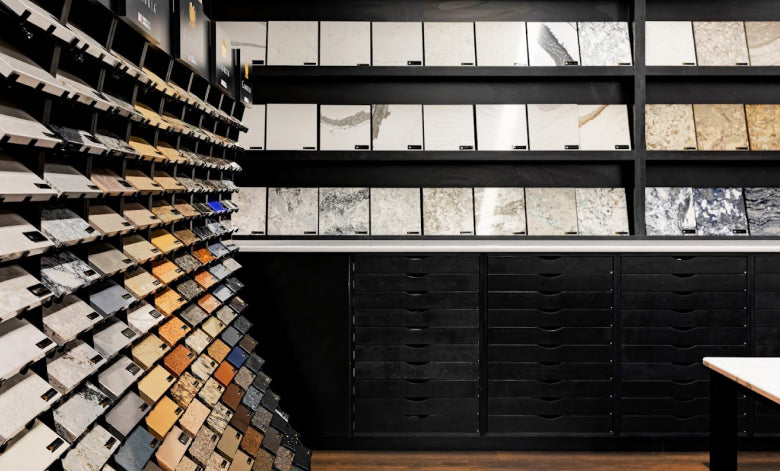Picking out new countertops is one of the most important choices you’ll make when designing your kitchen. Your countertops will not only influence the aesthetic of your kitchen; they’ll also need to accommodate your unique lifestyle needs. Through the years, we’ve found quartz to offer the best long-term quality and value. Nonetheless, to give you a better sense of what’s possible, we’re here to make your life easier by walking you through all the different types of countertops out there.
-
Granite: Granite is a popular, natural stone option for your kitchen counters. In general, granite is composed of quartz, feldspar, mica and other minerals that make each slab entirely unique. Granite countertops come in a wide range of colors and patterns, and add an organic, luxurious feel to any kitchen. They’re also durable and both heat and scratch-resistant.
Granite requires some upkeep to limit stains, and tends to be heavier, which means it needs extra reinforcement. Another downside to granite is that it’s often the most expensive option.
- Marble: Marble is a timeless, elegant option for your kitchen countertops. Pastry chefs might be inclined to pick marble because it’s naturally a cooler surface, too.
Though marble is gorgeous, it is notoriously difficult to maintain. It is highly susceptible to stains, scratching and chipping. In addition to already being an expensive option, marble also needs regular care and maintenance that can quickly add up. - Laminate: Laminate kitchen countertops are versatile, budget-friendly and easy to maintain. There are plenty of colors and patterns to pick from, so chances are you’ll find something right for your kitchen design.
Though laminate might seem like the perfect option on paper, it does have its downsides. Since it’s a more affordable choice, it likely won’t add much resale value to your property. It’s also susceptible to heat and water damage, and hard to repair. - Butcher Block: Butcher block or wood countertops can add a warm, organic vibe to your kitchen. It’s one of the most eco-friendly options available, and both stains and scratches can be sanded down.
As with any countertop, there are a few cons: Most butcher block kitchen counters require regular oiling to keep them from cracking. Wood is also susceptible to heat and water damage, which can be frustrating if you cook a lot. Another downside to butcher block is that it retains bacteria if not properly cleaned. - Concrete: Concrete countertops can make any kitchen feel instantly modern. They’re also easily customizable when it comes to shape and texture, and they are generally durable.
On the other hand, concrete kitchen counters are often expensive and require regular sealing to limit stains. Concrete can also crack if it’s not properly installed. - Soapstone: Soapstone countertops are beautiful and practical, as they are non-porous and naturally resistant to stains and bacteria. They’re also heat-resistent. Another great quality about soapstone is that it gets better with time so long as you maintain it properly. This means that it needs regular oiling to ensure the patina is even.
While soapstone is durable in a lot of ways, it is prone to scratches because it’s a softer surface. There are also limited color options, as soapstone is typically a shade of gray. - Solid Surface: Solid surfaces like Corian are a combination of natural minerals and acrylic resins. There’s a lot to love about solid surfaces: They’re non-porous, easy to clean and repair, and can seamlessly integrate with your sink if you’d like. Solid surfaces can be damaged by high heat or sharp objects which can be challenging for some home chefs.
- Stainless Steel: Stainless steel countertops are most often found in commercial kitchens because they are incredibly durable and resistant to both heat and bacteria.
While some might like the modern or industrial appeal of stainless steel countertops, others might find them cold and even noisy. It’s also easy to scratch and smudge which is less than ideal if you like your kitchen to be neat and clean! - Tile: There’s a lot to love about tile kitchen countertops, starting with the fact that they are usually a more affordable option. Tile also comes in a lot of different colors and shapes, and is great for any DIY-ers. Plus, most tiles are heat and scratch resistant.
The downsides of tile are that they can chip or crack if they’re impacted. Grout can also be difficult to clean – especially in high-traffic areas, like a kitchen. - Quartz: Alright, we saved the best for last. Quartz is an engineered stone that can look like natural stone without all the hassle. It is non-porous and highly resistant to stains, scratches, and bacteria. Another perk of quartz is that it comes in a wide variety of colors and patterns, so you’re bound to find the right option for your kitchen. While quartz can be more expensive than other countertop options, it generally requires less maintenance and can last a lifetime.
There’s a reason quartz is increasingly the most popular kitchen countertop option: Timeless, easy to maintain, and highly durable. Come visit one of our Select Surfaces showrooms in the Twin Cities area and see for yourself why so many people love quartz for their kitchen (or bathroom) counters. We are pleased to carry Cambria Quartz, a premier line of American-made quartz countertops that all come with a lifetime guarantee. We look forward to working with you!
